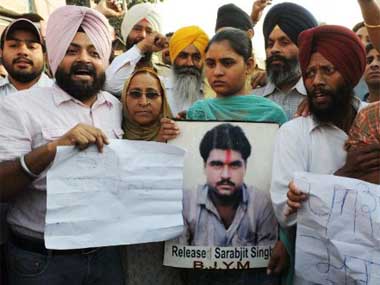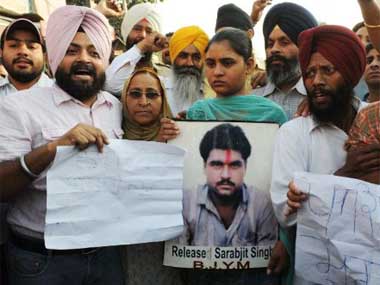Sarabjit Singh, a convict in the death row due to his involvement in the 1990 serial bomb blasts in Lahore and Multan that killed 14 people, today got a new lease of life with the Pakistani media reporting that President Asif Ali Zardari has the signed the order for his release. Sarabjit has been languishing in different Pakistani jails for the last 22 years with his life always hanging on the edge depending on the love-hate relationship between the two South Asian neighbours. “I have requested the Pakistan Interior Minister and my counterpart (Interior Secretary Khwaja Siddique Akbar) to release Sarabjit Singh. They have assured me that they would consider our request positively,” home secretary RK Singh told reporters in Islamabad in May this year.[caption id=“attachment_358063” align=“alignleft” width=“380” caption=“Well-wishers pleading for Sarabjit Singh’s release. AFP”]
 [/caption] During the talks India-Pakistan home secretary-level talks on 24 and 25 May, the Indian delegation had cited the release of Pakistani virologist Khalil Chishti and requested Islamabad to release Sarabjit as well. Sarabjit was given death sentence, but his execution was indefinitely put off by the Pakistan government. He is currently lodged in Kot Lakhpat Jail in Lahore. During the Indian home secretary’s visit to Pakistan, the Pakistani media also vouched for the release of Sarabjit Singh. Press Council of India chairman Markandey Katju has in the recent past made several appeals to Pakistan government seeking the release of Sarabjit, who has languished in various jails for over two decades after being accused of having caused the Lahore bomb blast of 1990. A Pakistani journalist has thrown his weight behind Sarabjit Singh’s release plea. While the authorities have not responded to Katju’s appeals yet, Syed Faseih Iqbal, an eminent Pakistani journalist and a member of the country’s Press Council, has seconded the demand in a letter to the PCI chairman. “I am pleased to observe that all peace loving people in Pakistan have appreciated your appeal and expressed their support for it,” Iqbal said in his letter. “We share a common opinion that pardon to Sarabjit Singh, if granted, may prove to be a turning point culminating in a full-fledged peace process between our two countries,” he added. In his letter, Iqbal also acknowledged the role that Katju and others had played in the release of 82-year-old Pakistani microbiologist Mohammed Khalil Chishty, who was lodged in an Ajmer jail. “We in Pakistan acknowledge the positive role you and your colleagues played in paving way for the release of Dr Khalil Chishty, who is now back with his family thanks to a wave of positive confidence building measures, including your sincere efforts in this regard,” Iqbal said. Iqbal added that Katju’s earlier appeal to Pakistani President Asif Ali Zardari on Sarabjit Singh’s behalf had broken some ice. In his letter, Iqbal said that the issue of cross-border prisoners must not be used for political purpose, rather it should be considered purely on humanitarian grounds.
[/caption] During the talks India-Pakistan home secretary-level talks on 24 and 25 May, the Indian delegation had cited the release of Pakistani virologist Khalil Chishti and requested Islamabad to release Sarabjit as well. Sarabjit was given death sentence, but his execution was indefinitely put off by the Pakistan government. He is currently lodged in Kot Lakhpat Jail in Lahore. During the Indian home secretary’s visit to Pakistan, the Pakistani media also vouched for the release of Sarabjit Singh. Press Council of India chairman Markandey Katju has in the recent past made several appeals to Pakistan government seeking the release of Sarabjit, who has languished in various jails for over two decades after being accused of having caused the Lahore bomb blast of 1990. A Pakistani journalist has thrown his weight behind Sarabjit Singh’s release plea. While the authorities have not responded to Katju’s appeals yet, Syed Faseih Iqbal, an eminent Pakistani journalist and a member of the country’s Press Council, has seconded the demand in a letter to the PCI chairman. “I am pleased to observe that all peace loving people in Pakistan have appreciated your appeal and expressed their support for it,” Iqbal said in his letter. “We share a common opinion that pardon to Sarabjit Singh, if granted, may prove to be a turning point culminating in a full-fledged peace process between our two countries,” he added. In his letter, Iqbal also acknowledged the role that Katju and others had played in the release of 82-year-old Pakistani microbiologist Mohammed Khalil Chishty, who was lodged in an Ajmer jail. “We in Pakistan acknowledge the positive role you and your colleagues played in paving way for the release of Dr Khalil Chishty, who is now back with his family thanks to a wave of positive confidence building measures, including your sincere efforts in this regard,” Iqbal said. Iqbal added that Katju’s earlier appeal to Pakistani President Asif Ali Zardari on Sarabjit Singh’s behalf had broken some ice. In his letter, Iqbal said that the issue of cross-border prisoners must not be used for political purpose, rather it should be considered purely on humanitarian grounds.
From gallows to home: Zardari signs Sarabjit's release order
FP Staff
• June 26, 2012, 19:34:23 IST
The recent release of Pakistani virologist Khalil Chishti had paved the way for Sarabjit Singh to head home soon.
Advertisement
)
End of Article